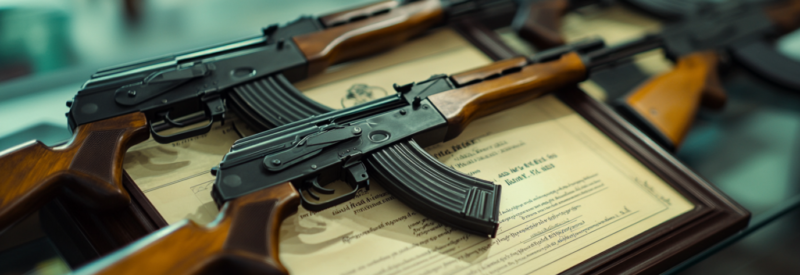If you are interested in starting a business selling, importing, or manufacturing firearms, the first step towards making that dream a reality is to apply for an FFL. An FFL, or federal firearms license, is a requirement for every individual who wishes to conduct official business in the firearms sector. In this article, we will walk through the five easy steps to getting an FFL in Missouri.
We will start by looking at the FFL requirements at both the state and federal levels, the costs traditionally associated with an FFL license, and the different types of FFLs you can choose from based on your business model. Let’s dive in.
Getting a Missouri FFL: An Introduction
As mentioned previously, FFL stands for Federal Firearms License. To legally sell, manufacture, or import guns and ammunition, a merchant or business must first obtain an FFL from the Bureau of Alcohol, Tobacco, Firearms and Explosives (ATF).[1]ATF. “atf.gov”. Accessed on May 24, 2024.
When applying for a Federal Firearms License, there are three potential tiers of regulation. Federal regulations exist at the base, with state laws that build on top of those. Local laws and regulations will vary depending on where you hope to start your business.
Let’s start by taking a look at regulations implemented at the federal level.
Step 1: Meet All of the FFL Requirements
In Missouri, the first step in acquiring a federal firearms license involves making sure that you meet the basic mandatory qualifications. In this case, those qualifications fall under federal, state, and local categories. The ATF sets the federal requirements, which are the same in every state. From there, each state can put its own specific rules and regulations into action. Some states are surprisingly lenient, while others are decidedly less so. Let’s examine how all three sectors comprise the comprehensive process for acquiring an FFL in Missouri.

Federal requirements
FFL requirements do not vary from state to state. Some of the basic requirements are as follows: all FFL applicants in Missouri must be able to legally own a gun, must be 21 years or older, and must be a legal US citizen or permanent resident. These requirements exist in part to protect the overall safety of firearms customers, though they also apply to merchants. Merchants looking to enter this sector should also familiarize themselves with specific details regarding age requirements for gun ownership.

State requirements
If you are actively looking to obtain an FFL in Missouri, you’re in luck. Missouri is a gun-friendly state, and it has yet to implement any additional licensing beyond what is required at the federal level. In other words, if you qualify for an FFL federally, you will also be eligible in Missouri. However, any business operating in Missouri must register at the state level. It is worth noting that practices may vary from state to state, at least in relation to things like mandatory waiting periods.

Local and zoning requirements
When applying for an FFL in Missouri, it helps to keep a few things in mind. While Missouri is a tolerant state regarding firearms requirements, merchants and vendors still must deal with local zoning laws. This may prove to be the most challenging part of securing your FFL, as a firearms business can be controversial depending on the neighborhood in which it operates. Many people don’t want a firearms business in either a residential or high-foot-traffic area for fear of potential violence.
While this is an entirely understandable concern, it can also be a bitter pill for firearms merchants to swallow. The truth is that your average zoning department is filled with decent, hard-working people who are merely trying to do what’s in the city’s best interests. This is why learning to explain and pitch the type of firearms business you wish to start will be a key component of your success. Will you be specializing in selling ammunition online? Or are your dreams more of the brick-and-mortar variety?
If you can answer questions like these, you can likely work with the zoning department and come to a mutually beneficial agreement.
Step 2: Select the Type of FFL You Need
You’ve selected a location. You’ve confirmed your eligibility for obtaining an FFL based on federal requirements. What’s next? It’s time to choose the type of federal firearms license you’d like to apply for. Much of this will depend on whether you’d like to function as a dealer, manufacturer, or importer, which means you will also need to develop a sustainable, practical business model, ideally, one based on the exact type of business you hope to start.

FFL license types
There are nine different types of federal firearms licenses, divided into three subcategories: dealer, manufacturer, and importer. To select the best option for you, you will have to evaluate the details of your business plan carefully. At that point, identifying the correct FFL should be reasonably straightforward.
Step 3: Complete an Online FFL Course
An online course is not a strict requirement for getting your FFL in Missouri. However, we recommend taking the course anyway. After all, better to be overprepared than underprepared. Moreover, online FFL courses will teach you everything you need to know about correctly filling out paperwork for each sale, what types of guns you are eligible to sell, and any reporting requirements, plus help with general business practices. Learning to understand the quirks of the industry is one step toward becoming an expert in your field and will ensure that you can operate your new firearms business successfully and according to the rules of the law.
Step 4: Apply for Your Missouri FFL
The fourth step in acquiring your FFL is the one you’ve been waiting for: it’s time to submit your FFL application. You are finally one step closer to your dream of being able to sell firearms and firearms accessories. Consequently, this step can only be completed once your business model is finalized, the correct FFL option has been selected, and you have met all federal, state, and zoning requirements. The application will include a fee, along with the following information:
- Application form (ATF Form 7/7CR) [2]ATF. “Application for Federal Firearms License”. Accessed on May 24, 2024.
- Fingerprints: The ATF needs your fingerprints to conduct a background check.
- Photographs: The ATF needs your photograph to create your FFL license.
- Any required supplemental documentation (for example, information pertaining to additional managers/business owners).
Step 5: Have an Interview with a Representative from Your Regional ATF Office
Upon completing your application, a local ATF office representative will contact you to schedule an interview with an Industry Operations Investigator (IOI). The purpose of this interview is to ensure that you understand the nuances of federal laws as they apply to your business. This investigator will also review your business plan and location to ensure it meets their standards. For many reasons, this is a critical step, so prepare accordingly. Following this meeting, the IOI will compile a report and send it to ATF.

FFL License Costs in Missouri
The ATF sets costs for FFL licenses across the country. That means the federal government regulates these prices for all 50 states, regardless of where you apply.
Getting a Federal Firearms License in Missouri: Closing Thoughts
Missouri is a gun business-friendly state, so you don’t need additional state licensing to get an FFL. All you need to prove is that you can pass the federal requirements. Once you’ve completed these steps, you can begin figuring out how you’ll accept customer payments.
Of course, firearms and firearm accessories are still a high-risk financial proposition. That’s why you’ll need to partner with a trustworthy and reliable merchant service provider, preferably one who specializes in helping hard-to-place businesses. So, if you want to open a business in the firearms industry, Missouri is a great place to do it.
Tired of hearing “no”?
We help businesses that are normally turned away
Approval
Rating
Missouri FFL FAQs
Do I need an FFL in Missouri?
Yes, if you plan on importing, manufacturing, or selling firearms and ammunition. An FFL is a federal requirement in all 50 states.
Who can apply for an FFL in Missouri?
Missouri has no additional state licensing requirements, which means anyone who passes the federal requirements can apply for an FFL.
Do I need to register as a business to get a Missouri FFL?
You will absolutely need to register your business with the state. Even if you’ve registered your business in a different state or if you’re thinking about moving, you will need to re-register in Missouri at some point in the process.
How can I find an FFL dealer in Missouri?
If you’re looking for a reputable FFL dealer in Missouri, we recommend the following tools:
ATF Website: Using the ATF’s website allows you to search for FFLs by zip code. If you have a potential FFL dealer, you can use the ATF’s eZ Check tool to verify the validity of the FFL license number.
Word of Mouth: If you have colleagues or loved ones interested in firearms, ask them who their FFL dealer of choice is. Asking people you trust is a great, easy way to find a well-respected local dealer.
Can you have a home-based FFL in Missouri?
Yes, as long as you are able to get zoning to approve your business location, you should have no problem getting a home-based FFL up and running.
Can I apply for an FFL with a Missouri gun trust?
No, it is not possible to apply for an FFL with a gun trust in any state. You may, however, be able to purchase or transfer a firearm with a Missouri gun trust (this process is known as an FFL transfer).
Does the BATF&E have requirements for an FFL in Missouri?
Among the ATF’s many responsibilities, the agency actively works to prevent firearms-related crimes and enforce federal laws related to the sale and possession of weapons. This includes setting prerequisites for obtaining a Federal Firearms License. Gun laws are a complex issue, and it is essential that every firearms merchant knows as much about what they’re selling as possible.
Do I need to apply for a SOT for my Missouri FFL?
An SOT is a “Special Occupational Taxpayer.” If you engage in activities including manufacturing, importing, or dealing NFA firearms and accessories such as machine guns, explosives, and silencers, an SOT may be your best option. There are three times of SOTs to choose from:
1 – Importer
2 – Manufacturer
3 – Dealer
Click here for the ATF’s list of firearms regulated under the NFA.
How long does it take to get your FFL in Missouri?
Preparing your business model and all requisite paperwork can be one of the most time-consuming parts of this process. The particulars of this procedure will vary on a case-by-case basis. Once you’ve successfully submitted the application, you will have your response within 60 days.
How can I transfer an FFL in Missouri?
It is not possible to transfer an FFL in Missouri. All parties involved in importing, manufacturing, and dealing firearms must have their own FFL. Even if you’re buying an established gun store, you will need to apply for your own FFL.
How much does an FFL transfer cost in Missouri?
The cost of this type of transfer will largely depend on the company you use, the locations you’re transferring between, and the firearm you’re transferring. As a rule of thumb, be ready to spend between $20 and $200.
How hard is it to get an FFL in Missouri?
Missouri is a state that has respect and tolerance for gun owners, and attaining an FFL within its borders is very doable. So long as you meet the federal requirements we’ve outlined in this post and follow all the necessary steps, you should have no problem getting your FFL approved and starting your new firearms business.
Article Sources
- Bureau of Alcohol, Tobacco, Firearms and Explosives. “About the Bureau of Alcohol, Tobacco, Firearms and Explosives.” Accessed on May 24, 2024.
- Bureau of Alcohol, Tobacco, Firearms and Explosives. “Application for Federal Firearms License.” Accessed on May 24, 2024.
- Bureau of Alcohol, Tobacco, Firearms and Explosives. “Federal Firearms License Search.” Accessed on May 24, 2024.
- Bureau of Alcohol, Tobacco, Firearms and Explosives. “Which firearms are regulated under the NFA?” Accessed on May 24, 2024.




